Alexander 2.13
Alexander the Great (*356; r. 336-323): the Macedonian king who defeated his Persian colleague Darius III Codomannus and conquered the Achaemenid Empire. During his campaigns, Alexander visited a.o. Egypt, Babylonia, Persis, Media, Bactria, the Punjab, and the valley of the Indus. In the second half of his reign, he had to find a way to rule his newly conquered countries. Therefore, he made Babylon his capital and introduced the oriental court ceremonial, which caused great tensions with his Macedonian and Greek officers.
The Punjab
India
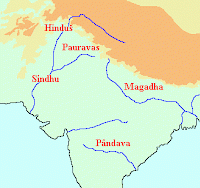
By the end of 327, Alexander had secured the northeastern frontier of his kingdom and was ready for a new campaign: to India, a country that the Macedonians already knew from the Histories by Herodotus of Halicarnassus and the History of India by Ctesias of Cnidus, but their reports were incredible. Invading India was like invading a country of fairy tales.
It was an unnecessary war, and its only cause must have been Alexander's curiosity and desire for war. Another argument to move to the east must have been the presence of two Indian princes at Alexander's court, Sisicottus and Omphis (or Sasigupta and Ambhi, to use their Indian names). The first was at war with the tribe of the Assacenes, the second was afraid of king Porus and tried to enlist foreign help against his enemy.
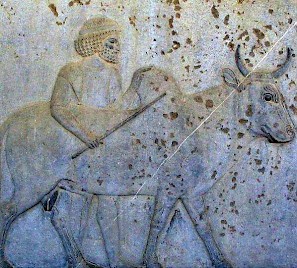
India as a whole consisted of three parts:
- the valley of the Indus in the west, which can be subdivided into three parts:
- Gandara, the valley of the river Cophen (modern Kabul) and the western part of the Punjab, which had, during the reign of Darius I the Great, been part of the Achaemenid empire but consisted in 326 of several small principalities, such as Peucelaotis, Massaga and Taxila;
- the eastern Punjab, the kingdom of Porus (Pauravas);
- the lower valley of the Indus, called Sindhu.
- the valley of the Ganges in the east. This was the powerful kingdom of Magadha; its capital was Pâtaliputra, modern Patna.
- the deep south, also known as Pândava.
Alexander was to move through Gandara and the kingdom of Porus, failed to attack Magadha, went south through the lower Indus valley, and ignored Pândava.
The Swat Compaign
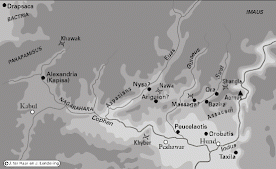
In the first months of 326, two armies invaded Gandara. Perdiccas and Hephaestion were to take the largest group along the Cophen through the Khyber pass to the river Indus, and had to build a bridge. On their way, they occupied a town called Peucelaotis (north of Peshawar). At the same time, Alexander commanded a smaller army - it included the battalions of Craterus and Coenus - against the tribes north of the main road. The Macedonians could not allow the Aspasians and Assacenes to remain neutral. After all, they could change position and cut off the main road.
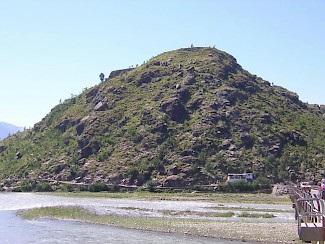
Alexander's campaign through this area was in fact little short of genocide. When he was lightly wounded during the siege of a hill fortress and it was taken, all defenders were massacred. In another valley, the terrorized population fled after destroying their own villages. A sad story is that about Alexander's men who, during a cold night, burned the small wooden boxes they found in the neighborhood of a town they were besieging. Too late they discovered that these boxes were coffins; the population was shocked about this sacrilege. When the capital of the Assacenes, a town called Massaga (near modern Chakdarra), surrendered, Alexander demanded that the mercenaries that had defended the town joined his own army, but after they had placed themselves at Alexander's mercy, he ordered their extermination.
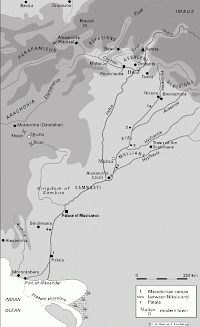
One of the puzzles of the Indian campaign is the visit to a place called "Nysa". Here, the god Dionysus was venerated, one of Alexander's mythological ancestors (text 1; text 2). It is not known which god was identified with Dionysus. Next to the town was a sacred mountain called Meros ("thigh") by the Greeks; it reminded them of the story that Dionysus was born from Zeus' thigh. In fact, the Indian name was Meru, the holy mountain or "axis" of the world.
The route to Nysa as described by the Greek historians of Alexander's campaign suggest a southerly location near the river Kunar, but a location more to the north, near modern Chitral, better fits the fact that there was ivy to be found on the spot. Moreover, there is an impressive mountain near Chitral, called Tirich Mir. And although a march to Chitral makes no strategic sense, it is perhaps to be preferred; Alexander's marches to Troy and Siwa made no strategic sense either, but had a lot to do with Alexander's presumed ancestry.
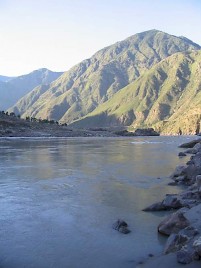
After a march through the valley of the Lower Swat, in which he captured Massaga, Bazira, and Ora, and crossing Shang-La pass, Alexander approached the Indus. Many people had fled to a high mountain fortress called Aornus (Indian Āvárana, "hiding place", modern Pir Sar). According to local legend, not even the god Krishna - identified by the Macedonians with Alexander's legendary ancestor Heracles - had been able to take the rock, which rose 1700 meters above the river. However, Alexander used native guides and managed to occupy a nearby mountain. His engineers built mound, and soon the fortress was taken. The capture of Aornus made no sense from a military point of view, but the message was clear: the Indians were facing the avatar of a god more powerful than Krishna.
Taxila
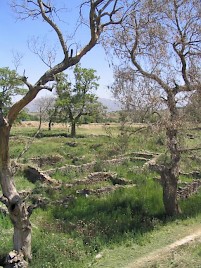
In April, the two Macedonian armies united near modern Hund, where Perdiccas and Hephaestion had built a bridge across the Indus. Alexander appointed a Macedonian, Nicanor, as satrap of Gandara. Now that everything was safe, the Macedonian army crossed the Indus and reached Taxila (Indian Takshaçila), the capital of one of the small states in the Punjab, where they were welcomed by king Omphis.
One of the things the Macedonian scientists were anxious to learn, was whether there was some truth to the famous story by Herodotus of Halicarnassus about the gold-digging ants, who were said to live in India. They seem to have received confirmation, but were unable to find out where these insects were living (text).

The Macedonians also met the Brahman sages, who commented on Alexander's claim that he was the son of a god that every human being descended from the gods (text 1; text 2).
Their leader, Dandamis, tried to show his guest that his conquests were futile: "You will soon be dead, and then you will own just as much of this earth as will suffice to bury you." Although these comments were not very encouraging, Alexander insisted that one of them should come with him, and so it happened. Calanus (Indian Kalyana), became Alexander's adviser and must have played an important role in his dealings with the Indians.
The discovery of gavials, which resemble crocodiles, in the Indus caused some speculation that this river was actually the Nile under another name, but this idea was corrected by the Indians. Finally, the Macedonians learned about Buddha, even though they never completely understood who he was. Nearchus, Alexander's admiral and historiographer, calls him the second king of India.
Porus
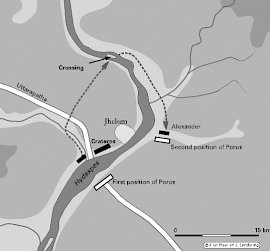
During Alexander's stay in Taxila, envoys came from the king of the Abissares (Abhiçara), a mountain tribe in Kashmir. They surrendered to Alexander, who never visited their country. Another Indian leader, Porus (Puru), the king of Pauravas, refused to come to terms with the god who had invaded India. He may have hoped that he was safe, because the river Hydaspes (Indian Vitaçtâ; modern Jhelum) was the border between his kingdom and that of Omphis, and in June, this river would swell because of the melting of the mountain snows and the advent of the monsoon rains.
The Macedonian high command knew that it had to act quickly. It seems that only half the army took part in the march to the east; probably, it was impossible to mobilize the rest of the army on short notice. The ships that had been used to bridge the Indus were carried along the main road, the Uttaräpatha (the modern Grand Trunk Road) to the Hydaspes, and although Porus did his best, he was unable to prevent his enemies from crossing the river during a thunderstorm (May 326). In a first skirmish, an Indian cavalry unit under Porus' son was defeated. The chariots he had used were unable to move through the rain-soaked mud.
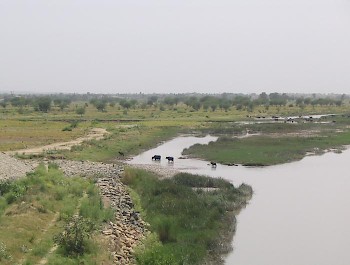
The Macedonians continued their march towards Porus' army. They were superior in numbers and equipment and had nothing to fear, except for Porus' elephants - an army unit that they had never encountered before. Porus placed his elephants in front of his infantry, knowing that the Macedonian cavalry could not attack them because horses fear elephants unless they have had a special training. On his wings, Porus stationed his chariots. When the Macedonians reached the place where the Indian king was waiting for them, they deployed their phalanx and moved slowly towards their enemy. Alexander commanded the Companion cavalry and the mounted archers of the Dahae, which were on his right wing.
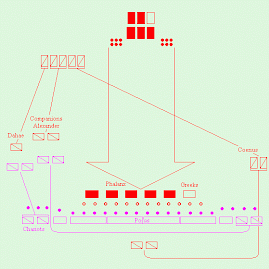
Seeing that his left wing chariots were outnumbered by the Macedonian cavalry, Porus moved his right wing chariots to the left; at that moment, the Macedonian cavalry commander Coenus suddenly moved to the now undefended Indian right wing and encircled the enemy lines, attacking them in their rear. Meanwhile, the Companions in Alexander's neighborhood and the Dahae were victorious against Porus' chariots, and archers were attacking the elephants. The Macedonian archers and phalanx started to kill the elephants' drivers; the animals panicked and fell back. From this moment on, the Indians were attacked from all sides: they had to defend themselves against the phalanx and their own elephants in front of them and the Macedonian cavalry in the rear. Nearly all Indian cavalry were killed; a few infantry men managed to flee; a wounded king Porus surrendered only after the destruction of his entire army.
Alexander founded two cities on the battle field, which he called Nicaea ("victory town") and Bucephala. The last name he chose to honor his war horse, which had died of old age in the days before the battle. Porus, who had lost his army and owed his life to Alexander, was appointed as satrap of his own kingdom. He could only be loyal. Omphis of Taxila must have been disappointed that he was forced to reconcile with his enemy Porus; after all, he had invited Alexander to fight against his eastern neighbor.
To the east
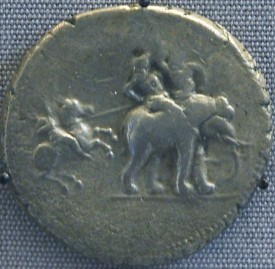
East of Porus' kingdom was the powerful kingdom of Magadha, which was more or less identical to the valley of the Ganges. Alexander set out to add this kingdom to his possessions. The fact that our sources do not give a real motive for this expedition is significant. The son of Ammon no longer explained why he went to war. However, he was approaching his limits.
By now, the Himalayan snows had melted and the rivers of the Punjab had swollen; and the monsoon season was beginning. Crossing the rivers between Pauravas and Magadha was difficult, but nonetheless, the army was ferried across the Acesines - at the time of the summer solstice (26 June) - and the Hydraotes. Shortly after the crossing of the river there was an evil omen: the moon eclipsed (27/28 June). A town called Sangala was besieged and taken. However, at the end of July, when Alexander ordered his men to cross the Hyphasis (Vipâs, Beas), they refused.
They had left Macedonia to punish Persia, and they had not only punished it, they had even conquered it. They had seen their king start to behave like a Persian, and they had tolerated his behavior. They had invaded India and had conquered Gandara and Pauravas. But now that they were requested to fight in faraway Magadha, which had never belonged to the Achaemenid empire and was thought to be situated at the edge of the earth, and now that they had to march through the continuous rains in the full heat of summer, they mutinied (text).
Alexander was furious. He must have imagined a different way to celebrate his thirtieth birthday. But he finally allowed himself to be persuaded by Coenus, the hero of the battle at the Hydaspes, and by the gods, who sent evil omens. This was important. To the king, it was imperative to stress that the gods, and not the soldiers, had forced him to return; had it been otherwise, he would have lost his authority.
Although he had not lost his face, Alexander continued to bear a grudge towards the people who had forced him to return Craterus, who may have sympathized with the rebellious soldiers and was becoming too successful a general anyway, was sent on honorable missions that kept him far from court; many veterans were left behind in a newly founded Alexandria on the east-bank of the Hyphasis, with little hope ever to return to Macedonia or Greece. Coenus died suddenly.